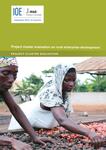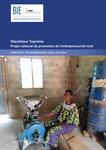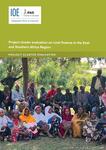Page Header

Downloads:
1
Post-Tsunami Coastal Rehabilitation and Resource Management Programme
Overview
The goal of the programme was to restore the assets of women and men directly or indirectly affected by the tsunami and to re-establish the foundation of their previous economic activities, while helping them diversify into new, profitable income-generating activities. Some of the notable contributions from the programme comprised activities in which IFAD has solid experience, i.e. building public-private partnerships (in the case of shrimp farming) and developing microcredit and microenterprises. For instance, the cluster shrimp farm at Vakarai has had a much clearer impact on incomes. The evidence indicates that the incomes of the farmers had increased by more than 50 per cent. On the other hand, IFAD engaged in activities which were not part of its core competence – for example, building houses for beneficiaries – and this meant that it could not leverage its expertise and experience to best effect. The evaluation argues for re-examining IFAD's role in post-crisis situations, especially in regards to focusing mainly on its core activities with a simpler design and a more flexible operational process, and giving due consideration to the linkages between poverty, gender and crisis in designing the programme targeting strategy.Report Details
| Year Published | |
| Type | |
| Joint | No |
| Partner/s | N/A |
| Consultant name | R. Stirrat |
| Agency Focal Point | Hansdeep Khaira |
| Focal Point Email | evaluation@ifad.org |
| Managed by Independent Evaluation Office | Yes |
| Country/ies |
YOU 'RE READING
Post-Tsunami Coastal Rehabilitation and Resource Management Programme










